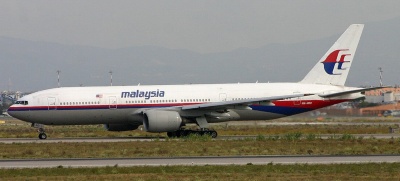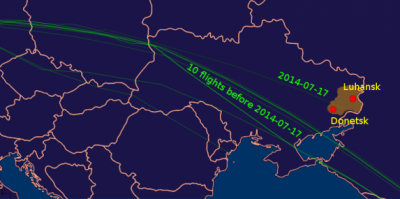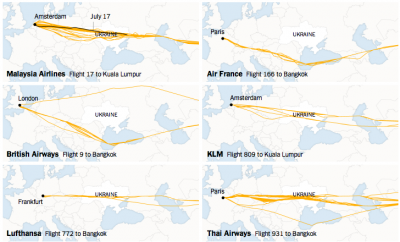Difference between revisions of "Malaysia Airlines Flight 17"
(Inaugurating) |
(→Alternative Positions: Adding images) |
||
| Line 15: | Line 15: | ||
===Alternative Positions=== | ===Alternative Positions=== | ||
| + | [[File:MH17_Flight_Paths.png|400px|right|thumb|[[MH17]] flight paths leading to 17 July 2014]] | ||
| + | [[File:nytimesflightpaths.png|400px|right|thumb|How other airlines avoid overflying Eastern Ukraine]] | ||
In a statement issued late in the day on July 17th, Russian President [[Vladimir Putin]] said: | In a statement issued late in the day on July 17th, Russian President [[Vladimir Putin]] said: | ||
:"I want to note that this tragedy would not have happened if there were peace on this land, if the military actions had not been renewed in southeast Ukraine. And, certainly, the state over whose territory this occurred bears responsibility for this awful tragedy." | :"I want to note that this tragedy would not have happened if there were peace on this land, if the military actions had not been renewed in southeast Ukraine. And, certainly, the state over whose territory this occurred bears responsibility for this awful tragedy." | ||
Revision as of 22:20, 20 July 2014

A Boeing 777-200 passenger plane, operating as Malaysia Airlines Flight MH17, crashed in the Ukraine, east of Donetsk on 17 July 2014. All 298 on board were killed. Flight MH17 departed the gate at Amsterdam-Schiphol Airport in the Netherlands at 12:14 hours local time, bound for Kuala Lumpur, Malaysia. It was airborne at 12:30 (10:30 UTC) from runway 36C and reached a cruising altitude of FL310 at 12:53 (10:53 UTC). Ninety minutes into the flight, at 12:01 UTC and just prior to entering Ukrainian airspace, the flight climbed to FL330. This altitude was maintained until last contact by ADS-B receivers of flight tracking websites, about 13:21 UTC.
At the point of last contact it was flying 1000 feet above airspace that had been restricted as a result of ongoing fighting in the area. Malaysia Airlines reported that MH17 filed a flight plan requesting FL350 throughout Ukrainian airspace. However, the flight was instructed by Ukrainian air traffic control to fly at FL330.[1]
Contents
Responsibility for the crash
Ukraine's Position
ITAR-TASS reported in June that Donetsk defence forces seized BUK missile defence systems from an army unit operating in the region, a point repeated and echoed by NATO Supreme Allied Commander Europe General Philip Breedlove in a Pentagon press briefing on 30 June 2014. However, this was directly contradicted on July 18th by Ukrainian Prosecutor-General Vitaly Yarema, who told Ukrainian Pravda that militias do not have access to BUK delivery systems or S-300s.
On July 19th, Ukrainian intelligence posted what they claim to be intercepted communications showing Russian responsibility for the downing of MH17 along with an English transcript. Numerous alternative media sources claim that the creation timestamp on the video indicates it was created before the crash took place.
Ukraine also claims that a post appeared on the social media account of rebel commander Igor Strelkov exactly 35 minutes after the crash appearing to take credit for the downing. Subsequent reporting, however, pointed out that the post was ambiguously worded and the social media account in question may not be run by Strelkov at all.
The Ukraine security service also published a video on July 18th purporting to show the actual BUK missile launcher used to bring down the plane being shuttled back across the border from Ukraine to Russia. Despite the fact that there is no confirmation from any source when, where or how this video was taken, or whether it in fact shows a BUK system on a Russian transport vehicle, it has been uncritically reported on in much of the western press.
Alternative Positions

In a statement issued late in the day on July 17th, Russian President Vladimir Putin said:
- "I want to note that this tragedy would not have happened if there were peace on this land, if the military actions had not been renewed in southeast Ukraine. And, certainly, the state over whose territory this occurred bears responsibility for this awful tragedy."
A report originally posted to Russia Today (RT.com) shortly after the downing suggested that the real target of the missile might have been President Putin’s plane, which was said to have been scheduled to fly over the exact same airspace as MH17 less than an hour after it was shot down. This claim has since been retracted and RT has noted that Putin has been avoiding Ukrainian airspace altogether since the recent coup took place in Kiev.
According to a report circulating widely in the alternative media, a Spanish air traffic controller working in the Ukraine on the 17th tweeted a series of messages indicating that the Ukrainian military shot down the flight and that "Kiev authorities" and "foreigners" subsequently took over the civilian air traffic control centre overseeing the disputed airspace in an apparent cover-up. The twitter account (@spainbuca) of the alleged air traffic controller, "Carlos," was then reportedly removed. [UPDATE: Global Research is now reporting that this story is likely fake and that sources indicate the tweets were being sent out of London.][2]
Some researchers suggest that the timing of the disaster, coming as it does right after Putin heralded the beginning of the long-awaited BRICS Development Bank is more than coincidental. This theory posits that the crash was staged by the US/EU/NATO or other powers as part of a proxy war taking place in the "new cold war" between Russia (one of the key players in an organisation that is seen as a key rival to the so-called "Washington Consensus" institutions, the IMF and the World Bank) and the US.
Some have suggested that the takedown of MH17 was also related to the six passengers on board who were heading to an AIDS conference in Melbourne hosted by the International AIDS society. The theory holds that the researchers were going to question the origins of AIDS and were taken out in a similar manner to Dr Jonathan Mann.
Yet others point to the numerology of MH17, noting "Flight MH17, a Boeing 777, first flew on 7-17-97 and crashed 17 years later, on 7-17-14." It has also been linked to a bizarre video of a speech IMF President Christine Lagarde gave at the National Press Club in Washington on 15 January 2014 in which she repeatedly told the audience to pay attention to the "magic number 7″ and made numerological connections to WWI and other events.
Compared to Lockerbie
First Minister calls for international investigation
One Scot is known to have died after Malaysia Airlines Flight MH17 crashed in east Ukraine, First Minister Alex Salmond has confirmed. 44-year-old Stephen Anderson is reported to have attended school in Inverness and served 23 years with the RAF, including running the search and rescue team at Lossiemouth in Moray. Describing the incident as an "appalling atrocity", Mr Salmond called for an international investigation to take place "quickly and effectively". He added:
- "It is now vitally important that an international investigation into the cause of the crash proceeds swiftly and effectively, and that investigation teams are given full access to the crash site. The Scottish government is in touch with the Foreign and Commonwealth Office to ensure that any and all relevant expertise and experience in Scotland will be made available to the investigation now and in the coming weeks."[3]
Echoed by David Cameron
On his Facebook page, Prime Minister David Cameron commented:
- Like the horror of Lockerbie in 1988 when I was a young man, the images of the burnt-out Malaysian plane, 298 victims and their personal effects strewn across the wheatfields and villages around Grabovo in eastern Ukraine will never leave me.
- Ten of our own citizens died; we grieve for them this weekend. So too did 27 Australians, including members of a family who had previously lost relatives on flight MH370; 43 Malaysians and 192 Dutch citizens also died — a huge blow to our friends and allies. We stand shoulder to shoulder with those countries and with all those affected by this outrage.
- But alongside our sympathy there is also anger. Anger that this could happen; anger that a conflict that could have been stopped by Moscow has been fomented by Moscow; anger that some in the West, instead of finding the resolve to deal with this issue, have simply hoped it would go away.
- We must establish the full facts of what happened. But the growing weight of evidence points to a clear conclusion: that flight MH17 was blown out of the sky by a surface-to-air missile fired from a rebel-held area.
- If this is the case then we must be clear what it means: this is a direct result of Russia destabilising a sovereign state, violating its territorial integrity, backing thuggish militias and training and arming them.
- We must turn this moment of outrage into a moment of action. Action to find those who committed this crime and bring them to justice. But this goes much wider than justice.
- In Europe we should not need to be reminded of the consequences of turning a blind eye when big countries bully smaller countries. We should not need reminding of the consequences of letting the doctrine of "might is right" prevail. We should not need to be reminded of the lessons of European history.
- But we do. For too long there has been a reluctance on the part of too many European countries to face up to the implications of what is happening in eastern Ukraine.
- Sitting around the European Council table on Wednesday evening I saw that reluctance at work again.
- Some countries, with Britain at the forefront, have consistently pushed for action that reflects the magnitude of the long-term threat. They tend to be the countries with the closest physical proximity to Russia and the most direct experience of what is at stake. Their own independence and nationhood have come at a high price. They never forget it. But others seem more anxious to make this a problem to be managed and contained, not a challenge to be met and mastered.
- Elegant forms of words and fine communiqués are no substitute for real action. The weapons and fighters being funnelled across the border between Russia and eastern Ukraine; the support to the militias; the half-truths, the bluster, the delays. They have to stop.
- Some international crises are insoluble. Not this one. If President Vladimir Putin stops the support to the fighters in eastern Ukraine and allows the Ukrainian authorities to restore order, this crisis can be brought to an end. Of course there must be proper protections for Russian-speaking minorities. These issues can be addressed. But the overriding need is for Russia to cease its support for violent separatists.
- If President Putin does not change his approach to Ukraine, then Europe and the West must fundamentally change our approach to Russia.
- This is not about military action, plainly. But it is time to make our power, influence and resources count.
- Our economies are strong and growing in strength. And yet we sometimes behave as if we need Russia more than Russia needs us and the access we provide to European markets, European capital, our knowledge and technological expertise.
- We don’t seek a relationship of confrontation with Russia. But we must not shrink from standing up for the principles that govern conduct between independent nations in Europe and which ultimately keep the peace on our continent.
- So let us be clear about what needs to happen.
- First, there must be immediate access to the crash site and the crime scene must be preserved. The remains of the victims must be identified, treated with proper respect and dignity and returned to their families. There must be a ceasefire. And there must be a full investigation into what happened. Russia will have plenty of information about these events which it must make fully available — and straight away.
- Second, Russia must immediately halt supplies and training for the rebels. They do not represent the people of Ukraine. Without Russian support they will wither.
- Finally, we must establish proper long-term relationships between Ukraine and the European Union; between Ukraine and Russia; and, above all, between Russia and the European Union, Nato and the wider West.
- What form that relationship takes rests on how Russia responds to this appalling tragedy. Russia can use this moment to find a path out of this festering, dangerous crisis. I hope it will do so. But if that does not happen then we must respond robustly.
- Nearly 25 years ago Britain hosted the Nato summit that ended the Cold War and began the process of ushering Russia back into the councils of the world.
- In six weeks’ time Britain will host a Nato summit in Wales at which the relationship with Russia will again take centre stage. It is up to Russia which path that relationship now takes.[4]
